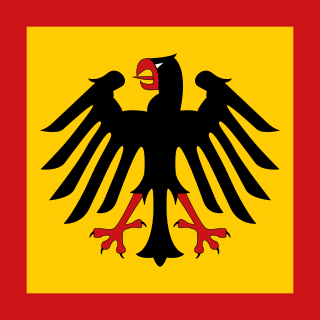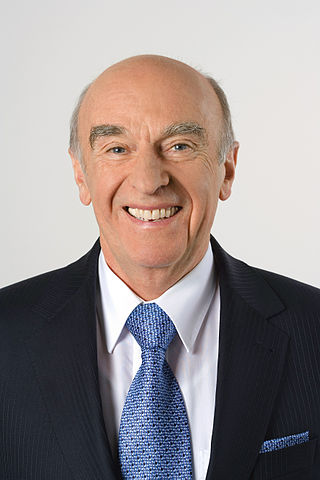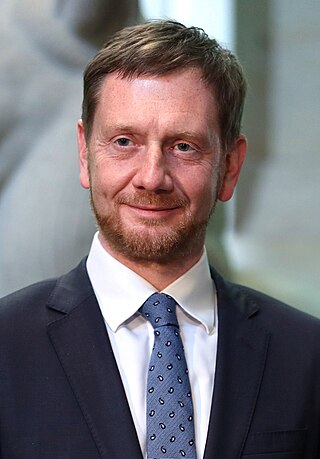
The Bundestag is the German federal parliament. It is the only federal representative body that is directly elected by the German people, comparable to the United States House of Representatives or the House of Commons of the United Kingdom. The Bundestag was established by Title III of the Basic Law for the Federal Republic of Germany in 1949 as one of the legislative bodies of Germany and thus it is the historical successor to the earlier Reichstag.

Germany is a democratic and federal parliamentary republic, where federal legislative power is vested in the Bundestag and the Bundesrat.

The president of Germany, officially titled the Federal President of the Federal Republic of Germany, is the head of state of Germany.

Intensive pig farming, also known as pig factory farming, is the primary method of pig production, in which grower pigs are housed indoors in group-housing or straw-lined sheds, whilst pregnant sows are housed in gestation crates or pens and give birth in farrowing crates.

Animal husbandry is the branch of agriculture concerned with animals that are raised for meat, fibre, milk, or other products. It includes day-to-day care, selective breeding, and the raising of livestock. Husbandry has a long history, starting with the Neolithic Revolution when animals were first domesticated, from around 13,000 BC onwards, predating farming of the first crops. By the time of early civilisations such as ancient Egypt, cattle, sheep, goats, and pigs were being raised on farms.

Hans-Rudolf Merz is a Swiss politician who served as a Member of the Swiss Federal Council from 2004 to 2010. A member of the Free Democratic Party (FDP/PRD) until the foundation of FDP.The Liberals in 2009, he headed the Federal Department of Finance during his tenure as a Federal Councillor. Merz served as President of the Swiss Confederation in 2009.

Free range denotes a method of farming husbandry where the animals, for at least part of the day, can roam freely outdoors, rather than being confined in an enclosure for 24 hours each day. On many farms, the outdoors ranging area is fenced, thereby technically making this an enclosure, however, free range systems usually offer the opportunity for the extensive locomotion and sunlight that is otherwise prevented by indoor housing systems. Free range may apply to meat, eggs or dairy farming.

The chancellor of Germany, officially the federal chancellor of the Federal Republic of Germany, is the head of the federal government of Germany, and the commander in chief of the German Armed Forces during wartime. The chancellor is the chief executive of the Federal Cabinet and heads the executive branch. The chancellor is elected by the Bundestag on the proposal of the federal president and without debate.

Peter Bleser is a German politician of the Christian Democratic Union (CDU) who served as a member of the Bundestag from 1990 until 2021, representing Mosel/Rhein-Hunsrück.
The state of defence is the constitutional state of emergency in Germany if the country is "under attack by armed force or imminently threatened with such an attack". Established by a constitutional amendment in 1968 during the Cold War, this state of emergency gives the Federal Government extraordinary powers in wartime. It is laid down in Title Xa of the German Constitution. As of present, Germany has never been in the state of defence.
The Joint Committee is, together with the Federal Convention, one of two non–steady constitutional bodies in the political and federal institutional system of the Federal Republic of Germany. It is designed as an emergency parliament in the case of a State of Defence. It consists of 48 members of which two thirds are members of the Bundestag and one third are members of the Bundesrat, the latter representing the governments of the states of Germany (Länder). It was established in 1968 by an amendment of the Basic Law. Ever since then, the Bundestag and the Bundesrat have elected members to serve on the committee. However, since a state of defence has never been declared, the Joint Committee has never convened as of 2023.
Animal Welfare Labelling is intended to provide consumer information on welfare standards applied in the production of food of animal origin.

Robert Habeck is a German Green politician and writer who has been serving as Vice Chancellor of Germany, Federal Minister for Economic Affairs and Climate Action in the cabinet of Chancellor Olaf Scholz and as a Member of the German Bundestag for Flensburg – Schleswig since 2021. From 2018 to 2022, he also served as co-leader of Alliance 90/The Greens, alongside Annalena Baerbock. For the 2021 German federal election, he was a member of the leading duo, alongside Baerbock, who ran for chancellor of Germany.

Michael Kretschmer is a German politician of the Christian Democratic Union (CDU) who has been serving as Minister President of Saxony since December 2017. Since 2022, he has been one of four deputy chairs of the CDU, under the leadership of chairman Friedrich Merz.
The German Law on the Protection of Trade Secrets, or Trade Secrets Law in short, serves to protect business secrets against unauthorized acquisition, use, and disclosure. The law implements the Directive (EU) 2016/943 on the Protection of Trade Secrets in German law. It replaces the right to secrecy, which was previously regulated in §§ 17-19 of the Act Against Unfair Competition.

Nikolas Löbel is a German politician of the Christian Democratic Union (CDU) who served as a member of the Bundestag from the state of Baden-Württemberg from 2017 to 2021. He resigned in March 2021.

Carola Reimann is a German politician of the Social Democratic Party (SPD) who served as State Minister for Social Affairs, Health, and Equality in the cabinet of Minister-President Stephan Weil of Lower Saxony from 2017 to 2021. She previously represented Braunschweig in the Bundestag from 2002 until 2017.

The Scholz cabinet is the current cabinet of Germany, led by Federal Chancellor Olaf Scholz. The cabinet is composed of Scholz's Social Democratic Party, Alliance 90/The Greens and the Free Democratic Party, an arrangement known as a "traffic light coalition" in Germany after the parties' traditional colours, respectively red, green and yellow, matching the colours of a traffic light (Ampel). This traffic light coalition-government is the first of its kind at the federal level in the history of the German federal republic.
Paragraph 219a was a German penal law in the Strafgesetzbuch that prohibited medical professionals from mentioning that they provide abortions. It is out of force since 19 July 2022.
The Bürgergeld is Germany's unemployment payment introduced on 1 January 2023. The Bürgergeld was developed by Olaf Scholz's coalition government and agreed by Germany's two chambers in November 2022. Compared to its predecessor Arbeitslosengeld II, it has a higher unemployment grant. Adult jobseekers living alone now received a default sum of €502 per month, compared to previously €449. The introduction of Bürgergeld also increased the amount of personal wealth that beneficiaries can hold without being deducted part of their unemployment grant. A single adult can own up to €40,000. Bürgergeld also replaced the Sozialgeld, a benefit for people who cannot work.














